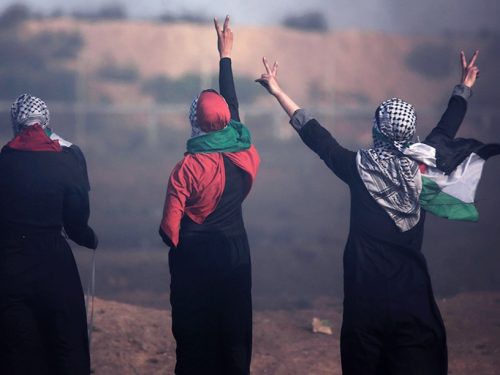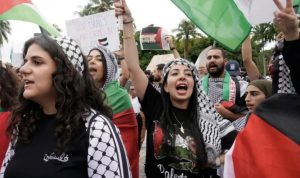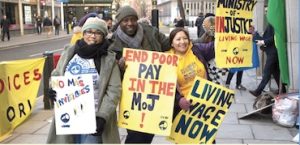Palestinian women we are not indifferent
to your struggle
December 6, 2023
On November 25, a global feminist action was held in defence of Palestine. In response to the appeal of Palestinian women “Ending the genocide in Gaza is a feminist issue!”, acts and initiatives of solidarity were organised by women’s movements from various countries. We think the initiative is very important. Not by chance, the date is also the international day for the elimination of violence against women. As women, we know very well what it is to be a victim of oppression. As workers, doubly oppressed and exploited, we should not and cannot be indifferent to the massacre that the Zionist and genocidal state of Israel is committing against the Palestinian people and in particular against Palestinian women.
By: Érika Andreassy
75 years of oppression and violence
For 75 years, Palestinian women have been victims of Israeli colonial oppression. In all these years of Zionist occupation, with the support and complicity of imperialist countries, rapes and sexist violence have been used as a weapon of war to humiliate and force them out of their lands; they suffer from violent attacks by Israeli settlers and live under the constant threat of having their houses destroyed and be displaced; they are afflicted by the fear that their parents, husbands and children will be arrested, wounded or killed and, if not, by their own mourning for the loss of their loved ones by the forces of repression.
The confiscation of goods and land and economic blockades to the territories where most Palestinians were confined (Gaza and the West Bank) raise female poverty and the lack of access to basic resources for survival to dramatic levels, which is aggravated by the impossibility of accessing the labour market, due to restrictions on movement between cities. The overload by household and unpaid care chores faced by poor women of the working class, is combined with the difficulty of helping their families in extremely hostile conditions, because even with access to restricted work, they are forced to support their families alone when their husbands are incarcerated, injured or killed.
The State of Israel violates the slightest international standards with impunity, subjecting Palestinian political prisoners to inhuman and degrading conditions. Women arrested often spend weeks or months in prison, without the right to defence and are subjected to the worst forms of humiliation, such as invasive magazines, sexual violence, psychological torture, beatings and solitary confinement.
To justify its current attack on Gaza, the Israeli government has been using the (unconvincing) excuse of eliminating Hamas, but we know it is not true. What is happening there is just another chapter of the policy of expulsion from the occupied territories and ethnic cleansing, which for decades the oppressive state of Israel has imposed on the Palestinian people and women.
Bombing hospitals, mosques and refugee centres or leaving civilians without light, without drinking water and without food, even preventing them from crossing the border to avoid death, has nothing to do with eliminating “terrorists”. It is a deliberate genocide and is far from an isolated case. This massacre, deliberately committed by the Israel Défense Forces and whose sexist component is expressed in the fact that Palestinian women (and their children) are the main targets, is part of the Zionist project of expelling Palestinians from their lands and needs to be vehemently repudiated by us women workers.
Pillars of the Palestinian resistance
But Palestinian women are not only victims of the conflict. An integral part of the struggle for the liberation and emancipation of the Palestinian people and partners of men in the resistance and fight against occupation and colonisation, historically they have been very active protagonists in the struggle for national liberation. The history of the Palestinian resistance is full of names of women who dared to face the invading army while their territory was colonised. The role they have played and continue to fulfil as fighters, organisers and leaders of the resistance, demonstrates both the revolutionary potential of women, and should serve as an example for fighters around the world.
Still at the end of the 19th century, they led the protests against the inaugural waves of Zionist immigration for colonial purposes. In 1903, they founded the first association of Palestinian women. In the 1920s, they formed several popular committees to articulate protests and other actions of civil disobedience and ensure aid to the injured in the demonstrations. In 1921, they formed the first Union of Arab-Palestinian Women, which organised protests against the British mandate and the Balfour Declaration – in which England, with the consent of France, Italy and the United States, expressed its intention to facilitate the establishment of a Jewish national home in Palestinian lands.
In 1936, they were essential in the national strike against British colonialism that favoured the migration of Jews to Palestinian territory. In addition to promoting protests and collecting funds to assist the families of the dead and prisoners, they were part of the operations to transport basic inputs and weapons to members of the organised resistance. In particular, peasant and Palestinian working class women played a key role in these processes, hiding weapons in their clothes or in the fields and traveling through the ground, sharing important information with the guerrillas, such as the location of British troops and supply routes.
Already before the consolidation of the Zionist project, in 1965, the General Union of Palestinian Women emerged, linked to the Palestine Liberation Organisation (PLO). During this period, several women left for direct action, in the face of the international failure to respond to the daily violation of human rights and Israeli expansion.
The intifadas were also well known for the central involvement of women in their action (to give you an idea, in the first intifada between 1987-1993, a third of the casualties were women). And every year, women join the protests on the anniversary of Nakba, demanding the right of return of the refugee population.
One of the current symbols of the Palestinian resistance is Ahed Tamimi. The young woman gained recognition in 2012, when, at the age of 11, she was filmed resisting her mother’s arrest. Shortly after, a photo in which she appears biting a soldier of the Israeli Forces, who was serving an arrest warrant against her older brother, went viral and she became known worldwide.
In December 2017, Tamimi participated in demonstrations against the decision of the Trump (US) administration to recognise Jerusalem as the capital of Israel. The protest in the Palestinian village of Nabi Salih in the West Bank became violent when about 200 Palestinian activists began throwing stones at Israeli soldiers. His cousin, Mohamed, 15, was hit in the head by a rubber bullet fired by an Israeli soldier. In response, Ahed and Nour Tamimi, (another cousin), reversed, slapping the Israeli military. For this crime (!), Tamimi was sentenced to eight months in prison. With the intensification of conflicts against the Defense Forces in the West Bank, after Israel’s attack on Gaza, she was arrested again and remains incarcerated.
Tamimi is arrested by forces of the State of Israel
In addition to the many names that are recorded in Palestinian history, thousands and thousands of women, inside and outside Palestine, in the diaspora, lead and sustain the resistance of their people to the oppression of Israel. They are activists and fighters whose names we do not know, who fight for the simple fact that their lives and their children depend on it, or to demand the right of refugees to return to Palestine.
In this context, motherhood has a huge meaning for struggle. For many women, being a Palestinian mother means not only starting a family, but also keeping the Palestinian people alive. As long as Palestinians continue to be born, the fight against the State of Israel will continue and the territory will not be homogeneously Jewish. For them, this is a way to resist, not to let their people become extinct. It is therefore not surprising that in the conflicts involving Israeli and Palestinian Forces (as in the current attack on Gaza) the preferred targets are women and children.
As exposed by the Haaretz newspaper about the t-shirts (t-shirts that have the shape of a T) used by Israeli soldiers, which denote violence against Palestinian women. Among the most used and sought-after t-shirts by the soldiers of the shooter unit, is that of the pregnant Palestinian woman, with a veil, in the centre of the target of a shooter with the famous slogan: “1 shot, 2 dead”. This attitude demonstrates how gender policy shapes the actions of the State of Israel.
For freedom, equality and rights
This does not mean that in the struggle for national liberation, Palestinian women renounce the struggle for their own rights as women, because they know that gender discrimination and sexist violence mean worse conditions to fight against the Zionist project. As Khitam Saafin, president of the Union of Palestinian Women’s Committees, explained: the occupation “harms everyone, but women carry the burden twice because they do not have enough power to face deaths, arrests and confiscation of land (…). Liberation is one step, but the other is social equality and internal democracy in Palestinian society.”
An example of the struggle of Palestinian women against their own oppression was the revolt for the femicide of young Israa Gharave in 2019, which took thousands of women to the streets demanding justice – resulting in the accusation of three members of Israa’s family for the crime – as well as improvements in the protection of victims of sexist violence and the reform of the Criminal Code of 1960, inherited from the Jordanian administration, in which the “defence of honour” is considered mitigating in the case of murder. This action generated the Tal’at women’s movement, which in Arabic means to leave, whose flags of struggle are mainly the fight against femicide, domestic violence, sexism and exploitation as well as the emancipation of Palestinians and Palestinians subjected to colonial oppression.
If the biggest enemy they face and the biggest cause of their oppression is currently the Zionist regime, both struggles (against colonial and gender oppressions) are not dissociated or in contradiction with each other but go together. As Soraya Misleh, Palestinian-Brazilian journalist, coordinator of the Front in Defense of the Palestinian People in Brazil and a PSTU militant said: “There will be no peace, no free women in Palestine, without the end of the Israeli occupation of Palestinian territory and the destruction of the State of Israel, but as members of the resistance and a fundamental part of the struggle for the liberation of their people, Palestinian women need to have their democratic rights assured and be able to fight in the same conditions as their companions”.
At the same time, both struggles are not dissociated from the class struggle at the world level and to be victorious they need to be fought independently and from a socialist and revolutionary perspective, which has as a strategy the destruction of the capitalist system, which ultimately is the one who sustains and reproduces all oppressions. This leads us to a fundamental issue that we will address in another article, about who is the social subject of the struggle for the liberation of the oppressed, whether they are Palestinians and/or women.
Translated fromhttps://litci.org/pt/2023/12/06/mulheres-palestinas-sua-luta-nao-nos-e-indiferente/





